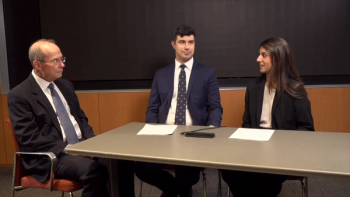
Dexamethasone inserts after cataract surgery saves time in patient counseling, surgical planning
Lisa Nijm, MD, discusses how utilizing a dexamethasone intracanalicular insert after cataract surgery saves time for practices.
Lisa Nijm, MD, reports that use of a dexamethasone intracanalicular insert (Dextenza, Ocular Therapeutix) after cataract surgery saves a practice up to 40 hours when compared to a standard postoperative drop routine.
In addition to saving practices time and energy, use of Dextenza increased patient compliance and reduce treatment burden as fewer postoperative counseling sessions were required.
Video transcript
Lisa Nijm, MD: My research that I presented today focuses on utilizing a dexamethasone intracanalicular insert to assess whether there's time saved on patient callbacks and surgery planning.
For this study, we collected user experience and feedback on utilizing Dextenza for cataract surgery patients compared to using standard postoperative drops.
There were 19 practices in total; they performed an average of 160 cataract surgeries per week when we looked across the practices. And for the study, they had to perform at least 10 cataract surgeries utilizing Dextenza.
In analyzing the data from the study, were able to see that by utilizing Dextenza, staff saved 45% time counseling postoperative patients when utilizing Dextenza compared to standard drops. This translated to about 15.5 minutes per patient. And when you looked overall, we're over 40 hours, staff hours, per week, so it is equivalent of one full-time staff per week that was saved by utilizing Dextenza.
In addition, the satisfaction rate among the staff was very high for utilizing Dextenza, with 95% of staff reporting positive feedback in utilizing Dextenza versus conventional drops.
So in conclusion, I think that the results of this study show the benefits to practice of utilizing a postoperative steroid regime like Dextenza for a practice to be able to time save and really translate into practical benefits for the practice, where they are not spending as much time counseling patients postoperatively using drops, as well as decreasing the overall burden or expense on the practice and ensuring compliance with patients. Thank you very much.
Note: This transcript has been lightly edited for clarity.
Newsletter
Don’t miss out—get Ophthalmology Times updates on the latest clinical advancements and expert interviews, straight to your inbox.





























